
Getting to know Your Speaker Package—Continued
Wall Mounting
The speakers can easily be wall mounted by using the keyhole slots. To prevent the speaker from vibrating against the wall, attach four of the supplied spacers to the keyhole fins on the rear of each speaker.
■Mounting vertically
To mount the front speakers vertically, use the keyhole slot shown to hang each speaker on a screw that’s securely screwed into the wall.
Rubber spacers
Keyhole slot for vertical wall mounting
■Mounting horizontally
To mount the center speaker horizontally, use the two keyhole slots shown to hang each speaker on two screws that are securely screwed into the wall.
Keyhole slots for horizontal wall mounting
Rubber spacers
Caution:
A mounting screw’s ability to support a speaker depends on how well it’s anchored to the wall. If you have hollow walls, screw each mounting screw into a stud. If there are no studs, or the walls are solid, use suitable wall anchors. Use screws with a head diameter of 3/8" (9 mm) or less and a shank diameter of 1/8" (3.5 mm) or less. With hol- low walls, use a cable/pipe detector to check for any power cables or water pipes before making any holes. Leave a gap of between 1/4" and 5/16"
Wall
(We recommend that you consult a home installation professional.)
■Using Rubber Spacers with the Speakers
We recommend using the supplied rubber spacers to achieve the best possible sound from your speakers. The rubber spacers prevent the speakers from moving, providing a more stable setup.
Rubber spacers
Bottom of the speaker
8
